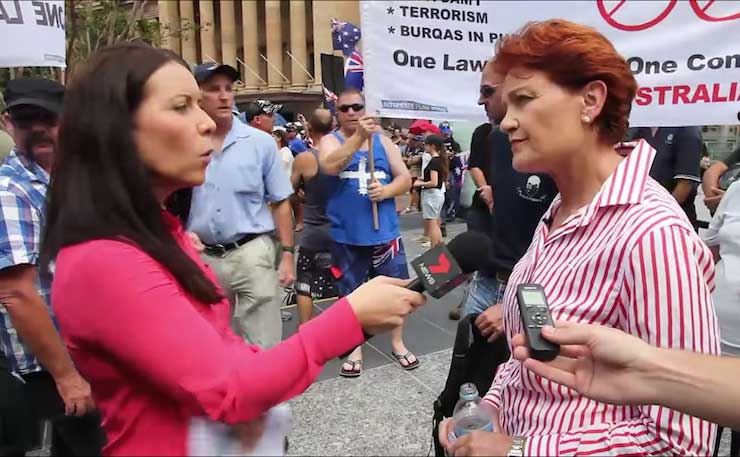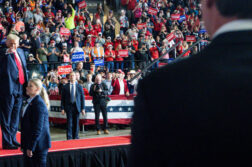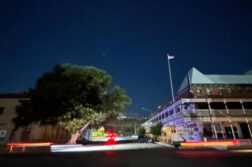One Nation has declined to explain a policy clearly calibrated to target Muslims, which would also require the entire nation to go to the polls and potentially have big implications for other religious groups. Max Chalmers reports.
Pauline Hanson’s One Nation Party has proposed a referendum to change the section of the Australian Constitution that offers protection for the free practice of religion.
But despite the enormity of that proposition, the party has declined to provide any detail about the policy, or explain what question it would like answered should such referendum take place.
Thanks to the lowered quotas needed to enter the Senate under a double-dissolution election Hanson has her best shot in years at returning to Canberra, and is vying to grab one of the last two spots in Queensland, where she heads up her eponymous party’s ticket.
According to One Nation’s website, in the case that Hanson or any other candidate is elected they will use their parliamentary position to “Call for a referendum to change Section 116 of the Australian Constitution.”
The policy is among several offered on a page outlining the party’s position on “Islam”, and appears to be its general attacks on the religion and its observers. “Islam is a constitutionally protected religion, as stated in Section 116 of the Australian Constitution,” the page asserts. “This means that Mosques, Islamic Schools and other Islamic institutions are void from paying tax.”
While committing to a referendum to change section 116 – which prevents a religious test for positions of public office, and stops the Commonwealth government from legislating against the free exercise of any religion – One Nation’s policy does not explain how it should be changed, or which clause in particular the party takes issue with.
Contacted on multiple occasions over a period of six days, no party official fielding media inquiries was able to explain the policy. Initially polite, the tone of the exchanges slowly changed.
At first, One Nation staffers insisted a response would eventually come. But after several days of phone calls and emails,one staffer, who answered the media line on multiple occasions, said “We have seen some of the articles coming out recently mentioning Pauline in New Matilda and she’s not impressed.”
While this staffer did not make it clear, this may have been a reference to a New Matilda article that appeared by the coincidence in the intervening period, which observed a similarity in appearance between a woman filmed peeing into a cup at a State of Origin match and Hanson.
The staffer then tried to explain the policy on section 116, before realising she was thinking of a different policy.
The call was eventually passed to another staffer, ‘Ian’, who said: “We don’t want to change anything and Pauline is not going to give any more interviews about this. You do shitty work on her and you’re dishonest. If you don’t understand what she’s saying is ‘define religion’. Islam is not a religion, it’s a medieval culture and I’m terminating this call now.”
Like his colleague, Ian also appeared to be referring to a separate policy being pushed by Hanson and co, which calls for a royal commission into whether Islam is a religion or not.
Before that could be pointed out – and true to his word – Ian hung up the phone.
Hanson did make a passing reference to section 116 in an interview on Sky News in May, though moved on quickly.
While any change to section 116 might, on the face of it, appear out of line with One Nation’s agenda, the party appears to have done its homework, even if its media handlers haven’t.
Mark Fowler, a Director of Neumann & Turnour Lawyers who is completing a doctoral thesis on tax exemptions for religious instructions at the University of Queensland, told New Matilda it is true that there is a connection between the tax exemptions enjoyed by religious institutions and section 116 of the constitution. He said this may help explain One Nation’s desire to hold a referendum on the section.
“The concern for the One Nation party’s position would be that they would run afoul of the establishment principles in section 116 by precluding any one religion from a legislated right. This perhaps suggests why they are motivated to advocate for change,” Fowler said.
Other One Nation policies openly target Muslims, calling for various forms or religious dress to be banned in public, surveillance cameras to be installed around mosques and schools, and investigations into various Muslims who receive welfare.
If One Nation did want to change section 116, they would either have to strip all religions of the protections it offers – unlikely given they describe Australia as “a country built on Christian values” – or make some other change explicitly excluding Islam.
Fowler said it would be theoretically possible to have a referendum which changed the Constitution to exclude Islamic institutions from section 116, but noted the low success rate of referendums in Australia and added such a move would be “a little inconsistent with the egalitarian Australian spirit.”
Section 116 says in full that the Commonwealth is “not to legislate in respect of religion” and that “the Commonwealth shall not make any law for establishing any religion, or for imposing any religious observance, or for prohibiting the free exercise of any religion, and no religious test shall be required as a qualification for any office or public trust under the Commonwealth.”
It is argued that this section may protect the tax exemptions religious instructions receive under Commonwealth law. Fowler said the US Supreme Court had found this to be the case in its jurisdiction.
“No Australia court has ever drawn this link explicitly (principally because the question has never been brought forward), however, there is a lengthy consideration of the question of tax exemption and the U.S. Constitution’s First Amendment, which section 116 (almost) verbatim replicates,” Fowler said.
Any general changes to section 116 would be likely to have profound implications for all religious groups in Australia.
“We consider religious freedom to be a fundamental part of Australian life,” Peter Wertheim, Executive Director of the Executive Council of the Australian Jewry, told New Matilda. “We would therefore be opposed to any attempt to diminish religious freedom by altering section 116 of the Constitution.”
Like One Nation, the conservative Australian Christian Lobby – usually a noisy advocate for religious liberty – was unable to respond to New Matilda’s questions about potential changes to section 116 by deadline.
Donate To New Matilda
New Matilda is a small, independent media outlet. We survive through reader contributions, and never losing a lawsuit. If you got something from this article, giving something back helps us to continue speaking truth to power. Every little bit counts.





